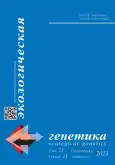Social and ethical component of genetic technologies
- Authors: Yakovleva I.V.1, Gaidukova S.E.1, Kamionskaya A.M.1
-
Affiliations:
- Skryabin Institute of Bioengineering, Federal Research Centre “Fundamentals of Biotechnology” of RAS
- Issue: Vol 21 (2023): Спецвыпуск
- Pages: 68-69
- Section: Genetically modified organism. The Нistory, Achivements, Social and Environmental Riscs
- Submitted: 31.07.2023
- Accepted: 06.09.2023
- Published: 04.12.2023
- URL: https://journals.eco-vector.com/ecolgenet/article/view/567811
- DOI: https://doi.org/10.17816/ecogen567811
- ID: 567811
Cite item
Full Text
Abstract
The technologies of genome editing and synthetic biology are becoming more and more accessible today and, in combination with the application of artificial intelligence in biotechnology, especially powerful. A feature of today’s stage is the rapidly changing landscape of engineering biological systems, which requires revision and updating of the biosafety framework. The proposed new oversight measures are as follows: а) screening for DNA synthesis orders and sequences of concern; b) environmental metagenome sequencing to search for synthetic organisms [1]. At the same time, DNA ‘printers’ are appeared on the market today, that blurs the boundaries of access to synthetic DNA. It is significant that no government currently requires screening or regulates it, and this system works on a benevolent basis. Additionally environmental surveillance requires for a long time to define base line. With the new scale of human activity, new social risks also arise: new forms of discrimination and inequality, confidentiality of personal data in biotechnology projects, multiplication of biotechnology and artificial intelligence risks.
Thus, the idea of “responsible researches and innovation” (RRI) [2], and trend to address safety early at the concept stage — “Safe by design” have come into the focus. A number of RRI principles can be formulated at the proof concept stage for a genome- edited project: benefits for most citizens; transparency, the public comment cycle prior to the start of the experiments; responsibility, precautions, liability; justice, redress; well-being, social good.
Full Text
Social and ethical component of genetic technologies
The technologies of genome editing and synthetic biology are becoming more and more accessible today and, in combination with the application of artificial intelligence in biotechnology, especially powerful. A feature of today's stage is the rapidly changing landscape of engineering biological systems, which requires revision and updating of the biosafety framework. The proposed new oversight measures are as follows: а) screening for DNA synthesis orders and sequences of concern; b) environmental metagenome sequencing to search for synthetic organisms [1]. At the same time, DNA ‘printers’ are appeared on the market today, that blurs the boundaries of access to synthetic DNA. It is significant that no government currently requires screening or regulates it, and this system works on a benevolent basis. Additionally environmental surveillance requires for a long time to define base line. With the new scale of human activity, new social risks also arise: new forms of discrimination and inequality, confidentiality of personal data in biotechnology projects, multiplication of biotechnology and artificial intelligence risks.
Thus, the idea of “responsible researches and innovation” (RRI) [2], and trend to address safety early at the concept stage – “Safe by design” have come into the focus. A number of RRI principles can be formulated at the proof concept stage for a genome- edited project: benefits for most citizens; transparency, the public comment cycle prior to the start of the experiments; responsibility, precautions, liability; justice, redress; well-being, social good.
About the authors
Irina V. Yakovleva
Skryabin Institute of Bioengineering, Federal Research Centre “Fundamentals of Biotechnology” of RAS
Author for correspondence.
Email: iraiakovleva@mail.ru
ORCID iD: 0000-0002-1568-8907
SPIN-code: 7794-8359
Russian Federation, Moscow
Sofya E. Gaidukova
Skryabin Institute of Bioengineering, Federal Research Centre “Fundamentals of Biotechnology” of RAS
Email: plasmid@yandex.ru
Russian Federation, Moscow
Anastasiya M. Kamionskaya
Skryabin Institute of Bioengineering, Federal Research Centre “Fundamentals of Biotechnology” of RAS
Email: akamio@fbras.ru
ORCID iD: 0000-0001-9815-9578
SPIN-code: 4171-9364
Russian Federation, Moscow
References
- Hoffmann SA, Diggans J, Densmore D, et al. Safety by design: Biosafety and biosecurity in the age of synthetic genomics. iScience. 2023; 26(3):106165. doi: 10.1016/j.isci.2023.106165
- Soeteman-Hernández LG, Bekker C, Groenewold M, et al. Perspective on how regulators can keep pace with innovation: Outcomes of a European Regulatory Preparedness Workshop on nanomaterials and nano-enabled products. NanoImpact. 2021;14(11):100166. doi: 10.1016/j.impact.2019.100166
Supplementary files










